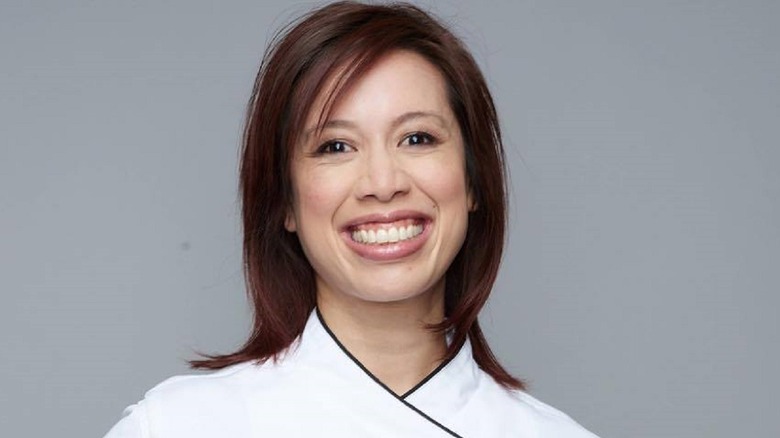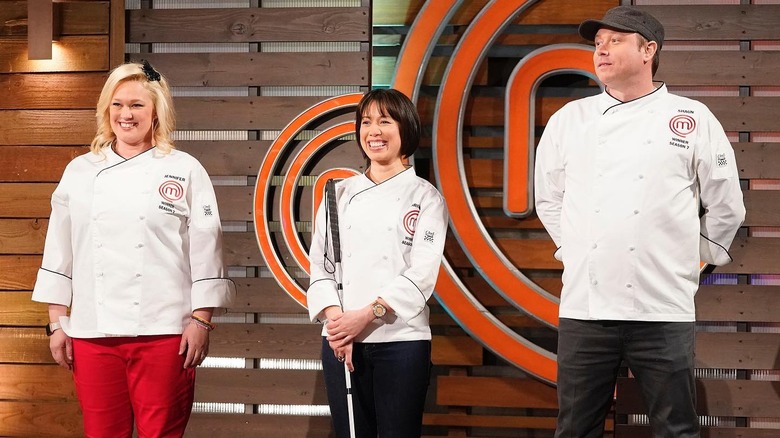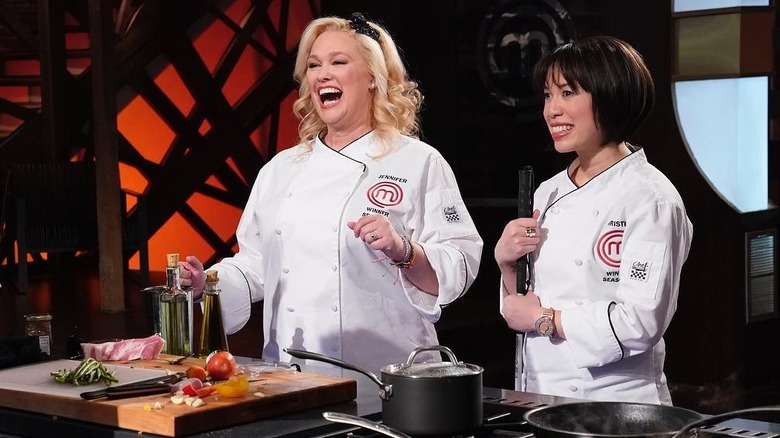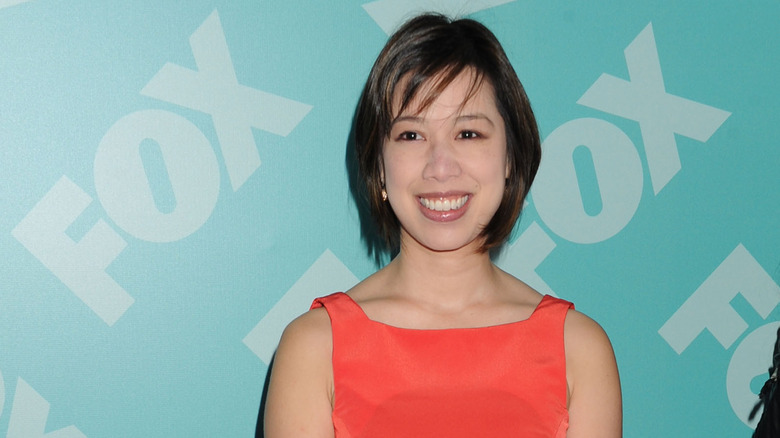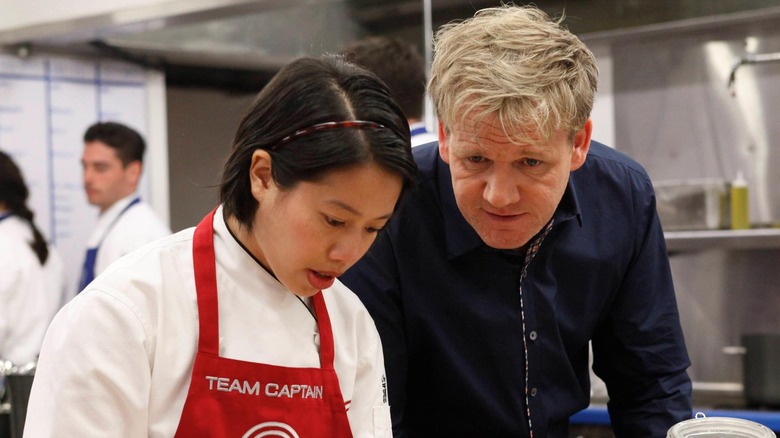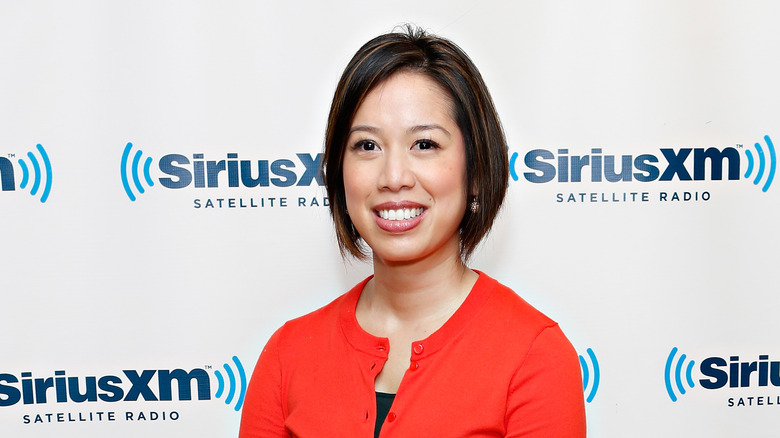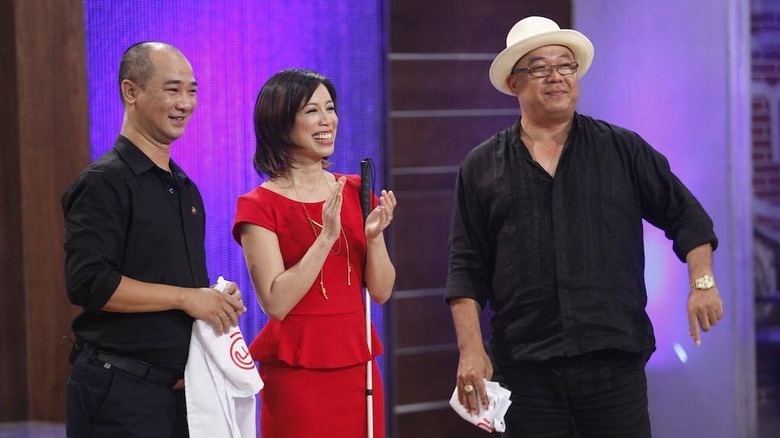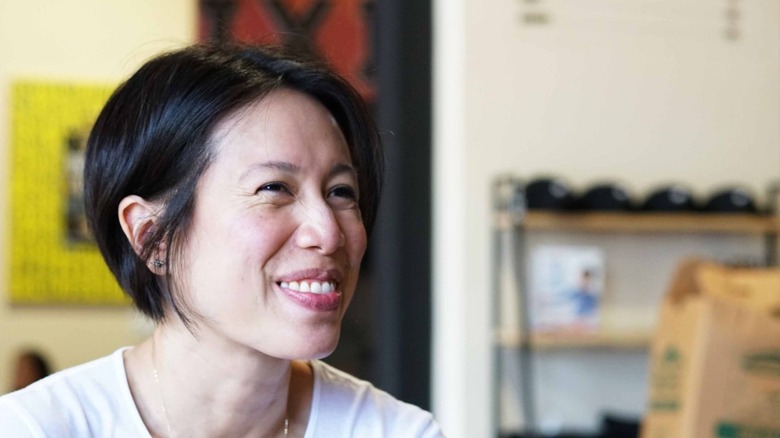MasterChef Winner Christine Ha Dishes On Being The First Blind Contestant - Exclusive Interview
We may receive a commission on purchases made from links.
Sitting down to watch a cooking show is always awe-inspiring. There's a thrill that comes with witnessing talented cooks tackling nearly impossible feats in the kitchen, and it's made even more interesting with unique ingredients, time restraints, and judges in the mix.
"MasterChef" is one of those shows, and after 11 seasons it's still going strong, it has showcased some of the best talents in the world of cooking. Amongst that talent? "MasterChef" winner Christine Ha, aka The Blind Chef, and she took the world by storm with her charming personality and incredible dishes.
Best known for taking the crown on "MasterChef" Season 3 in 2012, while being the first-ever blind contestant on the show, Ha has since continued to inspire others, from novice home cooks to those who are visually impaired. In an exclusive interview with Mashed, the cookbook author and restauranteur shared all about her experience as a blind contestant on "MasterChef," how her life has changed since winning, and her other endeavors to help offer accessibility to all.
Christine Ha shares why she tried out for MasterChef and the inspiration behind her cooking
Why did you decide to try out for the third season of "MasterChef?" What prompted you to do that?
Basically, it was the encouragement of my husband. He likes to watch Gordon Ramsay and the opportunity came up. "MasterChef" was doing auditions in Austin, which was about two and a half hours from where I live in Houston, in terms of a drive. And I love cooking. To me, I considered it just a hobby.
What I like about it is just the science and the art behind cooking. And most of all, I like making other people happy by feeding them. As I gradually lost my vision, I had to reteach myself how to do things in the kitchen, starting from the basics over and over again. I got to a point where I was eventually able to cook full meals and I would do that for my friends and my family, for holidays, and for their birthdays. So they all were just encouraging me to go try out for the show because they thought my story was unique and interesting. And they themselves were fascinated by how someone with a vision impairment can still cook a good meal in the kitchen.
On the show, you told the story of wanting to recreate your mother's recipes. Why has this been important to you to recreate those recipes?
That's right. I tell people that it's a lifelong journey for me to do so. I think growing up, my mom was a very good home cook, but that's all I really knew was her cooking and I didn't really feel like I appreciated it until I got older and loved food. And then she had passed away and never taught me how to cook or never wrote down any recipes. So I didn't know until in hindsight that she cooked some amazing, humble dishes while I was growing up. So I think in a way, to keep her memory alive and her spirit in the kitchen alive, that I'm just constantly trying to recreate the foods that she used to cook for my family when I was growing up.
Christine Ha reveals the most difficult challenge from her time on MasterChef
What do you recall as being the most difficult challenge on "MasterChef?"
I know exactly what challenge was the most difficult and that was actually a team challenge. So the team challenges I enjoy a lot, but what makes it difficult is I'm now taken out of my element. I eventually got to know my own kitchen station and I know where everything is. I know where I put things. But when you take a visually impaired person out of their comfort zone or out of an environment that they know and put them in the field, for example, the different challenges where we had to go out and cook with a team in a food truck or on the military camp or whatever, that required me to learn a completely different kitchen environment and work with people who are not used to cooking with someone who's visual impaired.
So, oftentimes they would forget to tell me, "Christine, I moved your knife," or, "I took this dish." And it was very frustrating. So for me, the team challenges, while they were enjoyable because they were different, that's also the thorn in my side. It was that element where I was taken completely out of my comfort zone.
The particular team challenge that was the most difficult for me was actually the tag team one. This actually still took place in the "MasterChef" kitchen, but it was where we had to replicate a sushi platter. And it was tag team, meaning I was paired up with one partner, and every time the timer went off, we would have to switch places. So the other person would be standing on the sidelines, just watching one person cook, and then the timer would go off and then we would have to switch. And the difficulty in that is me coming in, I have no idea what my partner did to the station, what part she was at in the cooking process, where she put her knife, where she put the pot, what's on the stove.
Afterwards, I just remember being very upset at myself because I felt like I failed my partner Stacey in that challenge. And I told her I was ready to send myself home because it was just a very poorly executed challenge. So I think that was the most physically, mentally, and emotionally exhausting challenge.
The dish Christine Ha was most proud of on MasterChef
What was the dish that you were most proud of from your time on "MasterChef?"
Well, I guess it sounds kind of trite because everyone knows this episode from "MasterChef" that watched my season, but the apple pie episode. I think because I'm not an expert at baking, especially using the oven as someone who's visually impaired, it's very challenging because I can't see what's going on in the oven. So I have no idea if, for example, if a loaf of bread is rising, I don't know if the crust of a pie is turning golden. And you can't just pull out something while it's baking to necessarily taste it because, one, it's going to be super hot and then, two, you affect the temperature of it once you open the oven. So for me, baking is not my strong point and before the show, I think I'd only baked an apple pie one other time in my life.
So I was flying by the seat of my pants in that challenge and I thought I really botched the pie. And then when I went up to serve it to the judges it actually ... it wasn't the most beautiful pie, but it worked and it tasted good and it was cooked all the way. And that was really I think one of the turning points in the competition for me because I felt like, at that point, I started gaining some self-confidence in my cooking and trusting my intuition in myself more in the way I thought.
I think coming on the show, because I didn't know how other people's skills were in cooking because I couldn't see what they were cooking, I always just assumed I was the worst cook in the competition because I think I just had a lot of imposter syndrome. So I feel like that was one of the turning points in the competition for me to build self-confidence in not only myself, but just my cooking as well.
Christine Ha dishes on what it was like cooking for Gordon Ramsay
On the show, Gordon Ramsay noted that one of the practices he does with students is putting a blindfold on so that they can try food to really understand texture and flavor without actually seeing it. Do you think that being visually impaired perhaps drove you to be a better chef overall?
I think in some ways, yes ... We rely so heavily on our sense of sight that I think it sometimes distracts us from our other senses. So because I lack the sense of sight, I had to depend so much more [on] my remaining four senses to cook a meal. So I feel like I would be able to taste the nuances of a dish better than someone with sight perhaps could.
So I feel like I had to pay more attention to all the different multi-sensory aspects of cooking. And for example, I paid much more attention to the different textures, temperatures, or taste of a dish and I felt like I became more keen on balancing the flavors of a dish because I didn't have my sense of sight because the only way I was able to take in my environment was through my remaining senses. That became much more, I guess, a way for me to navigate the food world and the sense of taste.
What was it like having Gordon Ramsay try your food? What was your experience interacting with him?
I knew who he was, but I wasn't really revering him like the big celebrity chef that he is. So going into it, I knew he was a judge, I knew he was a very famous chef with a lot of Michelin stars behind his name, but if anything, I felt like it was challenging to cook for all of the judges, not necessarily just Gordon. But I feel like he had a soft spot for me because he knew I was always trying to learn and improve myself and I was humble and very much willing to accept their feedback and their advice. And I ended up building a very good rapport with Gordon. I think he's very charismatic and funny, and kind and he wanted, I think, for all of us to succeed as best as we can and with what we're given. So I would say, it was definitely an experience of a lifetime to be able to cook for him and have him judge your food and make you into a better cook.
Christine Ha shares her tips to help others who are visually impaired succeed in the kitchen
You co-hosted "Four Senses" to help others who are visually impaired learn how to cook. Why was it important for you to take that step and help others find accessibility in the kitchen?
I think because I came from the very same situation and I think learning to cook is part of becoming independent. And when you lose your vision, you lose a lot of your independence, and I think that was the hardest thing for me to grapple with. When I was losing my vision, I was no longer able to drive or to read my own mail, or initially to cook for myself. So I think it's empowering to be able to help people who lose their vision learn to be more independent, and one aspect of that is cooking. So for me, I thought the show was helpful and it was inclusive in a way where it wasn't just for people with vision impairment, but it was also for the novice cook, for example. So yeah, I thought it was just a way for me to give back to the world.
Do you have any advice for others who are visually impaired that are trying to master recipes in the kitchen?
My advice would be to embrace your mistakes and learn from them. I think as humans, we often are very hard on ourselves and expect the first time we try to do something it's going to be perfect. And I'm a culprit of that myself, because I'm such a perfectionist. My husband's constantly reminding me, "You can't expect the first time you try to cook something for it to turn out exactly the way it's supposed to be. It's a learning process." So I think that it's good for people to keep that in mind and that becoming a master at something or becoming an expert at something will take time and a lot of failures and a lot of trials, and that's okay. I say, keep a sense of humor in the kitchen and in life. If you set something on fire, hopefully, it's not too much damage, but it's a funny story and a funny memory to tell down the road.
And just celebrate all of the small victories that you've come across. So for example, when I lost my vision, I went from being able to cook an entire Thanksgiving meal for my family to barely being able to put together a decent peanut butter and jelly sandwich. And I remember being very upset because I felt like I had regressed so much, but eventually I tried again and I made a sandwich where the jelly wasn't always dripping out of the bread, or the slices of bread were aligned. And then the next thing I tried was frying an egg. And then the next thing I tried was boiling water and cooking instant noodles. And that just sort of builds upon itself and I just got better and better again at cooking.
And I look back and I think, "Oh, I wasn't able to do this last week, I wasn't able to do this last month or last year." So every time you make some sort of progress, I think it's important to reflect and acknowledge that you made some sort of progress, even if it's small, because all the small steps build into the bigger step.
Christine Ha looks back on what it was like being the first blind contestant on MasterChef
Winning "MasterChef" is a difficult feat by itself. As the first blind contestant on, what was it like for you to show people that it's possible while being visually impaired?
For me, the vision impairment is just one aspect of me. I didn't really think about myself coming on as, "Oh, I'm the first blind contestant. I have to figure out this kitchen differently." I guess my vision impairment had been such an integral part of my life that it was just one facet of me. So going on there, yes, there were adaptations I had to make to compete and I did feel like sometimes the challenges were very overwhelming, but for me, I'm also naturally a very competitive person. So, I would always want to try my best no matter what, even if I felt like maybe there were disadvantages for myself, but I think I turned the blindness into an advantage eventually because I always went into that kitchen really not knowing how other people were doing or what they were cooking.
I wouldn't second guess myself and change up my dish at the last minute, knowing that, "Oh, someone else is making something fancier than me. I need to change what I'm doing." So I started thinking like that every day when I went into that kitchen and just competed against myself and just made sure that I had learned something from my previous days on the show. And as long as I went into that kitchen being a better cook than I was the challenge, or the day, before then that's what really mattered most. I started competing against myself and I guess eventually that was the advantage.
Christine Ha shares how her life has changed since winning MasterChef
How would you say your life has changed since "MasterChef?"
It definitely changed a lot. My life turned upside down. I feel like it gave me a lot of new opportunities in television, in food. I was able to write a cookbook, which was a dream come true because I was in grad school for creative writing at the time when I was on "MasterChef." So to be able to write about food, that was a very awesome experience.
And then to have it become a New York Times bestseller was another dream come true besides winning the competition. And since then, I've just had a lot of great opportunities to inspire people all over the world and talks I do and events I do, cooking demos, pop-ups, and then a few years ago I was able to open my first restaurant in Houston, The Blind Goat. And I feel like it's solidified me as a legitimate part of the restaurant industry or the F&B industry. And then I opened a second restaurant last year during the pandemic and both restaurants are still surviving. So I would say "MasterChef" has very much changed my life. Yeah, a lot of great opportunities.
Can you share why your restaurant is named The Blind Goat?
Yes. So I wanted a whimsical name because that's the vibe I wanted for this gastropub, and I'm known as "the blind cook" or "the blind chef." So I knew that that was kind of going to be in the name of the restaurant. And then the goat is because I was born the year of the goat. That's my Zodiac sign.
If you had the opportunity to compete again on "MasterChef," would you?
I would say, I would only do it if I knew I'd win.
Pick up Christine Ha's book "Recipes From My Home Kitchen" if you're in need of some fresh culinary inspiration, and of course, next time you're in Houston be sure to stop by The Blind Goat.
